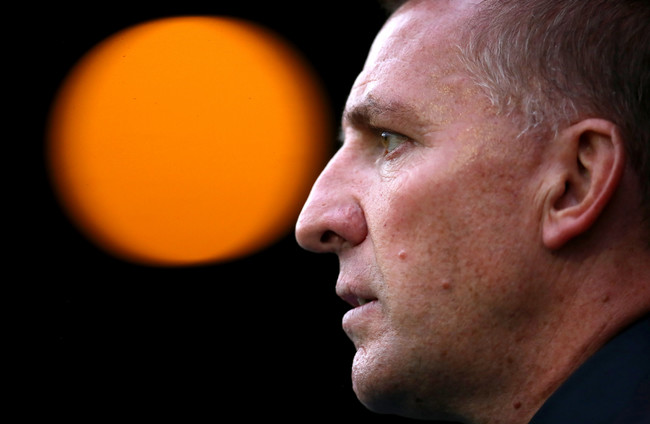THE POWER OF perception has never been taken lightly by Brendan Rodgers.
It has felt as though he has needed to re-invent himself throughout his coaching and managerial career.
Sometimes out of a necessity to thrive, other times to simply survive.
It’s why, when the County Antrim native turns 50 in January, he will not undergo some sudden kind of drastic transformation.
It has been a continual process since he started his work as academy director at Reading.
When he became lead youth coach at Chelsea in 2004 his reputation continued to soar.
But Rodgers didn’t want to become pigeon-holed in the bracket of talent developer. He had his sights set further.
It’s why he took the manager’s job at Watford and, having maintained their Championship status, returned to Reading to take over their first team. It was coming full circle, of sorts, but in Rodgers’ eyes the end points were far from complete.
He later recalled how this felt like the first sense of rejection for his managerial methods, his tenure coming to an end after only six months. There was, fleetingly, the lure of a prestigious coaching role on Roberto Mancini’s staff with Manchester City.
It could have been a welcome reprieve from the pressure of being the man in control while still remaining at an elite level. Then Swansea City offered him the head coach job in the summer of 2010.
A chance – perhaps the final one – to establish himself as a capable boss at that level.
Promotion to the Premier League was secured via the play-offs at the end of that season.
So, in the space of two years Rodgers dealt with being sacked, contemplated returning to coaching, before embarking on the job that would help shape the next transformation in his career.
His style of management, quality of coaching and, more importantly, impressive results in England’s top flight meant that he quickly became one of the youthful new breed establishing themselves at the summit of a game that was changing drastically.
The power of perception coming to the fore again.
It felt as if Rodgers was at the forefront of a culture that was evolving.
Managers in the Premier League were now becoming head coaches. Director of Football, Technical Director, and Sporting Director no longer felt like dirty terms or needless positions that only served to diminish the strength of the man standing on the touchline.
Now it was about structures, about frameworks, about working diligently within a system in the same way most other companies that were part of an industry worth billions operated.
Rodgers understood that.
The game felt as if it was changing on the pitch and dressing rooms were reflecting that accordingly.
More and more information was being required by talent that was developing throughout academy systems the world over. The manager needed to be capable of delivering that, as well as maintaining authority.
Rodgers then got the perfect chance to illustrate his ability to take on the biggest challenge of his career – managing Liverpool.
A decade has now passed since he arrived at Anfield.
It was here that his early days were peppered with comparisons to David Brent when some of his methods were captured in a fly-on-the-wall documentary.
But when he brought Liverpool to the brink of their first league title in 24 years – a team led by Luis Suarez in attack with the emerging Raheem Sterling given the platform to shine – at the end of his second term, a new seriousness surrounded him.
It’s why he was given a four-year contract to continue on the path to glory.
Instead it ended with another sacking early into the 2015/16 campaign.
This is when he faced the necessity to change tact in order to survive, and re-establish his credentials where expectation.
He did just that at Celtic, winning successive domestic Trebles in his two full seasons in Glasgow before an acrimonious departure to return to Leicester City.
Time still felt on his side to continue the job of altering perception.
From those early days as an academy sage to becoming someone who looked as if they would remain a struggling Championship boss, Rodgers then elevated his standing as a Premier League operator capable of revitalising an institution at Anfield.
The manner of his dominance in Scotland was not enough to satisfy his own desires and you get a sense now that he is nearing another turning point in a career that has plenty left to run, but may not have many more twists.
Leicester are toiling as key players continue to leave, while suitable replacements do not seem to be arriving.
There was a time when Rodgers’ name was genuinely considered for the Manchester United job. Instead, Erik ten Hag will be in the opposite dugout tonight.
Likewise, links to Arsenal were never far away, but now they would seem distant. Not only because of Mikel Arteta’s fine work, but the sense that Rodgers’ stock is on the slide.
On Sunday, another glaring reminder of the swift passing of time will stare him in the face.
Brighton’s Graham Potter is only two years his junior yet right now would be viewed as the kind of progressive, modern, exciting coach more likely to earn the kind of chance Rodgers has already had, and might not get again.
The next phase of his career looks to be less exciting, but with his experience and know how he might just fall into the category for a club looking for a safe pair of hands rather than one attempting to break through a glass ceiling.
















Well you won’t be winning any titles with the Rangers anyway butty
I’ve a feeling they’re going to slip up again
@Ardmore02: crack a Rodgers character joke. Go on ya know you want you
If for no other reason but your management of the most sectarian club in the world I do hope city win the title
@Martin Brennan: I’d say you’ve quite a few reasons.
@Martin Brennan: come out ye black and tans
What about the time you wanted to go to Chelsea. Wouldn’t believe a word you say
Overrated anyway
Complete legend, how does Scholes, Chadwick, Djemba, etc get mentioned same breath. And great to see him resurrect Rangers again. Deplorable league being won at a canter by 1 club 4 2 long now. Well done Mr. Liverpool
@Virgil Van Rock:
Ah lad come on ffs. What’s with the Djemba and Chadwick obsession? Every United fan knows they were wasters. The man living in Jupiter knows Scholes was a class act. Try again horse. I was a big fan of Gerrard in his playing days, he’s still hurting bad from the slip, and in fairness, he doesn’t try mask it either.
@Virgil Van Rock: Liverpool fans have the worst opinions on football haha Scholes is miles better than Gerrard and I’m a Barca fan Scholes controlled the game better than Gerrard could have dreamed of doing
@Gary: as footballers they were completely different. In my opinion it’s pointless comparing them as they both brought their own separate qualities to Liverpool and United. As a Liverpool fan, I rate Scholes, Keane and Henry as the three best players the league has seen but there’s no denying Gerrard was an exceptional footballer who carried an average Liverpool on his shoulders for many years.
@Gary: Scholes gets better with each passing year. Never once won the united player of the year.
@The Bloody Nine: completely right gerrard and scholes two completely differnt players. Scholes as he got older controlled the tempo of the game. Stevie G was roy of the rovers stuff magic moments when needed. In the premiership era our own mr roy keane was the greatest. What a f..king player he was.
@Virgil Van Rock: ressurect to what? Well done for MORE SLIPS. Must be contagious, baton to Karius and now to another fall guy NO DOUBT. dropped baton more appropriate!
@Virgil Van Rock: Funny how all the best playera in La Liga rated Scholes above Mr. Slippy. Much more natural talent there anyways rather than an overated work horse.
@The Bloody Nine: Nah Gerrard is not on Scholes level simple as that people don’t appreciate Scholes but if Scholes was Spanish he’d be up with Xavi and Iniesta
@Conor Pocock: Judging players off player of the year? Haha
@Gary: can’t remember too many matches when scholesy grabbed the game by the scruff , yeah great player alright but too quiet , Gerard leagues above him , yeah granted the red lad has more medals etc
@Gary: it would be unfair to judge people off Balon Dor or PFA player of the year alright. But club player of the year when held in the regard Scholes I think is fair enough. An excellent player nobody disputes but overrated.
Oh no
Ya spoke too soon Stevie………….sap
Ya spoke too soon Stevie
Someone should be taking bets on who the NEXT slip guy or fall guy will be that WILL stop that lot taking a title.
Ya spoke too soon Stevie, silly sausage
Apparently Stevie spoke too soon
Ya spoke too soon Stevie, silly muppet